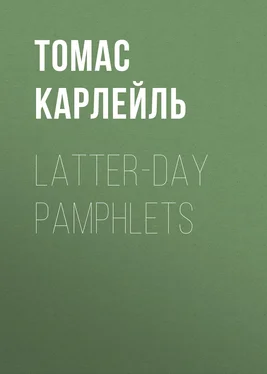Томас Карлейль - Latter-Day Pamphlets
Здесь есть возможность читать онлайн «Томас Карлейль - Latter-Day Pamphlets» — ознакомительный отрывок электронной книги совершенно бесплатно, а после прочтения отрывка купить полную версию. В некоторых случаях можно слушать аудио, скачать через торрент в формате fb2 и присутствует краткое содержание. Жанр: foreign_prose, literature_19, foreign_antique, на английском языке. Описание произведения, (предисловие) а так же отзывы посетителей доступны на портале библиотеки ЛибКат.
- Название:Latter-Day Pamphlets
- Автор:
- Жанр:
- Год:неизвестен
- ISBN:нет данных
- Рейтинг книги:5 / 5. Голосов: 1
-
Избранное:Добавить в избранное
- Отзывы:
-
Ваша оценка:
- 100
- 1
- 2
- 3
- 4
- 5
Latter-Day Pamphlets: краткое содержание, описание и аннотация
Предлагаем к чтению аннотацию, описание, краткое содержание или предисловие (зависит от того, что написал сам автор книги «Latter-Day Pamphlets»). Если вы не нашли необходимую информацию о книге — напишите в комментариях, мы постараемся отыскать её.
Latter-Day Pamphlets — читать онлайн ознакомительный отрывок
Ниже представлен текст книги, разбитый по страницам. Система сохранения места последней прочитанной страницы, позволяет с удобством читать онлайн бесплатно книгу «Latter-Day Pamphlets», без необходимости каждый раз заново искать на чём Вы остановились. Поставьте закладку, и сможете в любой момент перейти на страницу, на которой закончили чтение.
Интервал:
Закладка:
Certainly Emancipation proceeds with rapid strides among us, this good while; and has got to such a length as might give rise to reflections in men of a serious turn. West-Indian Blacks are emancipated, and it appears refuse to work: Irish Whites have long been entirely emancipated; and nobody asks them to work, or on condition of finding them potatoes (which, of course, is indispensable), permits them to work.—Among speculative persons, a question has sometimes risen: In the progress of Emancipation, are we to look for a time when all the Horses also are to be emancipated, and brought to the supply-and-demand principle? Horses too have "motives;" are acted on by hunger, fear, hope, love of oats, terror of platted leather; nay they have vanity, ambition, emulation, thankfulness, vindictiveness; some rude outline of all our human spiritualities,—a rude resemblance to us in mind and intelligence, even as they have in bodily frame. The Horse, poor dumb four-footed fellow, he too has his private feelings, his affections, gratitudes; and deserves good usage; no human master, without crime, shall treat him unjustly either, or recklessly lay on the whip where it is not needed:—I am sure if I could make him "happy," I should be willing to grant a small vote (in addition to the late twenty millions) for that object!
Him too you occasionally tyrannize over; and with bad result to yourselves, among others; using the leather in a tyrannous unnecessary manner; withholding, or scantily furnishing, the oats and ventilated stabling that are due. Rugged horse-subduers, one fears they are a little tyrannous at times. "Am I not a horse, and half-brother?"—To remedy which, so far as remediable, fancy—the horses all "emancipated;" restored to their primeval right of property in the grass of this Globe: turned out to graze in an independent supply-and-demand manner! So long as grass lasts, I dare say they are very happy, or think themselves so. And Farmer Hodge sallying forth, on a dry spring morning, with a sieve of oats in his hand, and agony of eager expectation in his heart, is he happy? Help me to plough this day, Black Dobbin: oats in full measure if thou wilt. "Hlunh, No—thank!" snorts Black Dobbin; he prefers glorious liberty and the grass. Bay Darby, wilt not thou perhaps? "Hlunh!"—Gray Joan, then, my beautiful broad-bottomed mare,—O Heaven, she too answers Hlunh! Not a quadruped of them will plough a stroke for me. Corn-crops are ended in this world!—For the sake, if not of Hodge, then of Hodge's horses, one prays this benevolent practice might now cease, and a new and better one try to begin. Small kindness to Hodge's horses to emancipate them! The fate of all emancipated horses is, sooner or later, inevitable. To have in this habitable Earth no grass to eat,—in Black Jamaica gradually none, as in White Connemara already none;—to roam aimless, wasting the seedfields of the world; and be hunted home to Chaos, by the due watch-dogs and due hell-dogs, with such horrors of forsaken wretchedness as were never seen before! These things are not sport; they are terribly true, in this country at this hour.
Between our Black West Indies and our White Ireland, between these two extremes of lazy refusal to work, and of famishing inability to find any work, what a world have we made of it, with our fierce Mammon-worships, and our benevolent philanderings, and idle godless nonsenses of one kind and another! Supply-and-demand, Leave-it-alone, Voluntary Principle, Time will mend it:—till British industrial existence seems fast becoming one huge poison-swamp of reeking pestilence physical and moral; a hideous living Golgotha of souls and bodies buried alive; such a Curtius' gulf, communicating with the Nether Deeps, as the Sun never saw till now. These scenes, which the Morning Chronicle is bringing home to all minds of men,—thanks to it for a service such as Newspapers have seldom done,—ought to excite unspeakable reflections in every mind. Thirty thousand outcast Needlewomen working themselves swiftly to death; three million Paupers rotting in forced idleness, helping said Needlewomen to die: these are but items in the sad ledger of despair.
Thirty thousand wretched women, sunk in that putrefying well of abominations; they have oozed in upon London, from the universal Stygian quagmire of British industrial life; are accumulated in the well of the concern, to that extent. British charity is smitten to the heart, at the laying bare of such a scene; passionately undertakes, by enormous subscription of money, or by other enormous effort, to redress that individual horror; as I and all men hope it may. But, alas, what next? This general well and cesspool once baled clean out to-day, will begin before night to fill itself anew. The universal Stygian quagmire is still there; opulent in women ready to be ruined, and in men ready. Towards the same sad cesspool will these waste currents of human ruin ooze and gravitate as heretofore; except in draining the universal quagmire itself there is no remedy. "And for that, what is the method?" cry many in an angry manner. To whom, for the present, I answer only, "Not 'emancipation,' it would seem, my friends; not the cutting loose of human ties, something far the reverse of that!"
Many things have been written about shirtmaking; but here perhaps is the saddest thing of all, not written anywhere till now, that I know of. Shirts by the thirty thousand are made at twopence-halfpenny each; and in the mean while no needlewoman, distressed or other, can be procured in London by any housewife to give, for fair wages, fair help in sewing. Ask any thrifty house-mother, high or low, and she will answer. In high houses and in low, there is the same answer: no real needlewoman, "distressed" or other, has been found attainable in any of the houses I frequent. Imaginary needlewomen, who demand considerable wages, and have a deepish appetite for beer and viands, I hear of everywhere; but their sewing proves too often a distracted puckering and botching; not sewing, only the fallacious hope of it, a fond imagination of the mind. Good sempstresses are to be hired in every village; and in London, with its famishing thirty thousand, not at all, or hardly,—Is not No-government beautiful in human business? To such length has the Leave-alone principle carried it, by way of organizing labor, in this affair of shirtmaking. Let us hope the Leave-alone principle has now got its apotheosis; and taken wing towards higher regions than ours, to deal henceforth with a class of affairs more appropriate for it!
Reader, did you ever hear of "Constituted Anarchy"? Anarchy; the choking, sweltering, deadly and killing rule of No-rule; the consecration of cupidity, and braying folly, and dim stupidity and baseness, in most of the affairs of men? Slop-shirts attainable three halfpence cheaper, by the ruin of living bodies and immortal souls? Solemn Bishops and high Dignitaries, our divine "Pillars of Fire by night," debating meanwhile, with their largest wigs and gravest look, upon something they call "prevenient grace"? Alas, our noble men of genius, Heaven's real messengers to us, they also rendered nearly futile by the wasteful time;—preappointed they everywhere, and assiduously trained by all their pedagogues and monitors, to "rise in Parliament," to compose orations, write books, or in short speak words, for the approval of reviewers; instead of doing real kingly work to be approved of by the gods! Our "Government," a highly "responsible" one; responsible to no God that I can hear of, but to the twenty-seven million gods of the shilling gallery. A Government tumbling and drifting on the whirlpools and mud-deluges, floating atop in a conspicuous manner, no-whither,—like the carcass of a drowned ass. Authentic Chaos come up into this sunny Cosmos again; and all men singing Gloria in excelsis to it. In spirituals and temporals, in field and workshop, from Manchester to Dorsetshire, from Lambeth Palace to the Lanes of Whitechapel, wherever men meet and toil and traffic together,—Anarchy, Anarchy; and only the street-constable (though with ever-increasing difficulty) still maintaining himself in the middle of it; that so, for one thing, this blessed exchange of slop-shirts for the souls of women may transact itself in a peaceable manner!—I, for my part, do profess myself in eternal opposition to this, and discern well that universal Ruin has us in the wind, unless we can get out of this. My friend Crabbe, in a late number of his Intermittent Radiator , pertinently enough exclaims:—
Читать дальшеИнтервал:
Закладка:
Похожие книги на «Latter-Day Pamphlets»
Представляем Вашему вниманию похожие книги на «Latter-Day Pamphlets» списком для выбора. Мы отобрали схожую по названию и смыслу литературу в надежде предоставить читателям больше вариантов отыскать новые, интересные, ещё непрочитанные произведения.
Обсуждение, отзывы о книге «Latter-Day Pamphlets» и просто собственные мнения читателей. Оставьте ваши комментарии, напишите, что Вы думаете о произведении, его смысле или главных героях. Укажите что конкретно понравилось, а что нет, и почему Вы так считаете.












